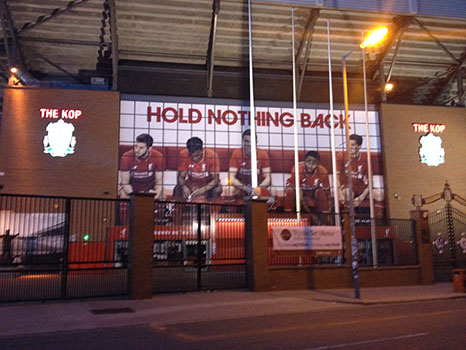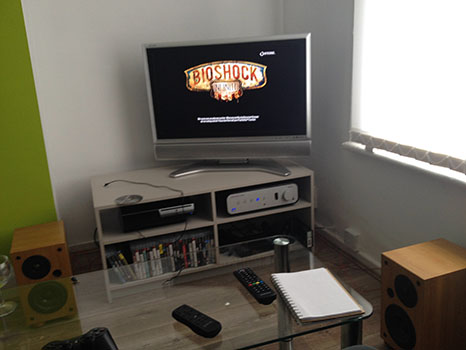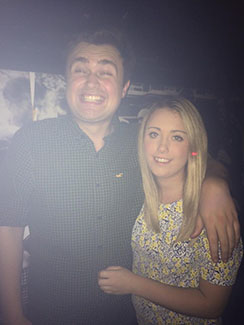
February 15, 2016, by James Smith
My Pre-reg Story (So Far): 6 Months in a Hospital and Becoming a ‘Proper’ Grown Up
The latest installment in James Smith’s pre-reg journey.
I remember the times when a ‘Pre-registration year’, or ‘pre-reg’, was a distant, almost-theoretical concept for me. That was four and a half years ago, when I first started my undergraduate degree in Pharmacy. Now, that concept is my reality; I am halfway through my pre-reg year and it’s been an intense and fantastic ride so far. I thought I would use this opportunity to write another blog sharing my hospital pre-reg experience and moving to a completely new city, offering tips and my advice along the way.
For those of you who have not read my previous pre-reg blog (which can be found here), I am currently undertaking a pre-reg year that is split 6 months in hospital and 6 months in industry. For those who do not know, the pre-reg year is effectively a year of on-the-job training that a pharmacy graduate has to undertake in order to become a qualified pharmacist. Pre-regs can work in a community pharmacy, a hospital pharmacy or they can spend 6 months working for a pharma company and 6 months in a hospital (which is what I am doing). I started my pre-reg at Whiston hospital, near St Helens (which is near Liverpool for those with geographical skills as poor as mine). The past week I finished at Whiston and have now moved over to the industry side of my year, working for Bristol-Myers Squibb.
The first day of my pre-reg was a daunting one. I woke up 10 whole minutes before my alarm was due to go off; a feat that had never occurred throughout my entire time as an undergraduate. It was the day that I was due to find out what this 6 months had in store for me. I remember there was a lot I was worrying about on the first day, from ensuring I was on time to making a good first impression on my new colleagues and tutor. Most importantly, my mind was occupied by a dilemma regarding the canteen food; should I take a packed lunch or risk getting ‘unidentifiable meat stew’ for lunch? These are the big questions in life.
My first day went well. I met the other two pre-regs who would be based at the hospital all year and we all got on extremely well from the offset. Knowing that I wasn’t alone, in not having a clue about what the next year held for me, was a reassuring notion. My tutor greeted us warmly and gave us an overview of what was expected of us over the next 6 months and what we needed to do during these first 2 weeks. As it turns out, the first 2 weeks were pretty dull. Most of the time was taken up by reading the department’s seemingly endless standard operating procedures (SOPs) and attending mandatory HR training events etc. Although this was incredibly boring, it was a necessary process for all pre-regs to go through and it was balanced out by the excitement of meeting new people in a new working environment. The rest of the Pharmacy department all seemed cheery and friendly, making us all feel welcome and supported. As I left the hospital on my first day, I finally held the belief that I may actually survive the pre-reg.
Now, as with all of my pre-reg story so far, things never seem to be so easy with me. Getting myself into a muddle with pre-reg applications (again, see previous blog) was only the start it seems. 12 weeks into my 26 weeks working in a hospital and my DBS (Disclosure and Barring Service, formerly CRB – criminal records bureau) check still hadn’t come through; nearly five months since I had sent off my application. This meant that I was seen as unable to go on to wards and even communicate with patients, which is what a majority of a hospital pharmacist’s job entails. Even worse, as an industry pre-reg, I was already expected to hit the same clinical standards as hospital pre-regs in half the time. I started to question myself: maybe I was a mastermind criminal, who was so good at deceit that I had fooled even myself. These first 12 weeks were not wasted by any stretch of the imagination. I spent four weeks in the aseptic production unit, lots of time in the dispensary, a short period in medicines information and carrying out audits for the Chief Pharmacist. But time was lost for me to develop my clinical skills. By the time my DBS had come back at week 13, my time to demonstrate my clinical competency was now reduced to 15 weeks, nearly a quarter of that of your average hospital pre-reg. My frustration and stress levels were sky high; but at least I knew I wasn’t a criminal.
The next week I started on wards. My clinical knowledge was extremely poor, having barely spent any time in a hospital setting before and not keeping up to date with my learning. My advice to all future pre-regs, (in hospital, community and industry) would be: DO NOT LET YOUR CLINICAL KNOWLEDGE GET RUSTY. Keep reading over things you learnt at university even if it’s only 10 minutes a day; it will help greatly. Naturally, the pre-reg year is a year to learn new clinical and professional information, but it helps if you have a strong foundation of knowledge in place. When I realised my clinical knowledge was as about as in shape as Homer Simpson, I used my morning commute to read over lecture notes and browse the NICE pathways websites to train my mind back into clinical mode. Additionally, asking pharmacists for any recommended reading prior to visiting their wards really helped me to prepare for the kind of things I would see on the ward and gain a basic knowledge that would be fortified throughout my time on wards.
Throughout the year, there are 4 important meetings, also known as reviews, which all pre-regs have with their tutors. These are held at 13, 26, 39 and 52 weeks. Here, the tutor assesses the pre-reg’s evidence records and sees how many ‘standards’ the pre-reg has met. These standards are a list of behaviours/tasks that the General Pharmaceutical Council expects all pre-regs to demonstrate before qualification, including things such as, ‘manage your time effectively’, ‘delegate tasks appropriately’ and ‘actively provide information and advice to healthcare professionals’. My first review went well. Despite the lack of DBS clearance, I had managed to acquire some strong pieces of evidence that covered the professional and organisation skills, although had barely touched upon the clinical standards. This was a slight issue, as it would be nearly impossible to meet these in the industry setting.
The next 13 weeks were spent almost solely on wards. I shadowed pharmacists, carried out medicine reconciliations with patients, checked the medicines patients had brought in for safety and clinical effectiveness, as well as checking that the doctors’ plans were the best and safest option for each individual patient. Each pharmacist would go through each patient case with me at first and point out some learning points, before giving me more independence and freedom to develop my own working style. By my 26 week review, I had 87 pieces of evidence to ensure that I met as many standards as possible, giving my tutor little reason not to sign me off as clinically competent. I was signed off and permitted to start my placement in industry, swapping with another pre-reg who had spent her first 6 months there. A tip for industry pre-regs: try to communicate regularly with the other industry pre-reg who you are swapping with, as well as the hospital-based pre-regs. Even better, become friends with them and socialise outside of work/study days: this can benefit both of you! For example, I spent an hour or so helping the industry pre-reg prepare and practice for a presentation she had to give, whilst she provided me with information on what will be expected of me and what my days will be like at BMS, thus helping me to prepare. She, along with the two hospital pre-regs, also helped me to settle into the city by inviting me to social gatherings and events. All in all, a strong relationship with your fellow pre-regs can make life so much easier for all of you.
There’s no doubt about it: the pre-reg is a tough year, but that doesn’t mean it can’t be enjoyable. As well as working full-day shifts (a new concept to many recent graduates), you have to use some of your ‘free-time’ to read up on pharmacy and clinical topics, revise for the dreaded exam and write up pieces of evidence that will prove to your tutor that you are performing well and are on track to becoming a competent pharmacist. However, it can be a fun and sociable year, particularly when in a hospital pharmacy department where there are other pre-regs and numerous pharmacists, technicians, dispensing and procurement staff. As a hospital/industry pre-reg, you also have regional study days and local study days. These days involve university-style lectures and workshops, aimed to consolidate and provide foundation knowledge to help tackle the pre-reg exam, as well as a chance to develop your professional skills. They are also a chance to meet other pre-regs in the local area, in addition to any old university friends or acquaintances. Finally, you have a full-time wage, probably for the first time. I spent mine wisely by going for a long weekend trip to Rome. Others I know have gone to even more extravagant places, such as New York, Canada and even Hull. Money can’t buy you happiness, but it can help you organise things you were too poor to do as a student.
I also had the joy of moving to a new city where I had no connections, no foundations and no idea what to expect. This was probably more of a challenge than the professional side of life. I feel that having a strong and comfortable life outside of work is important for success in any career. Building up a life from nothing after four years of a comfortable social life and relationships at university was never going to be easy. However, I found that everything slotted right into place for me in Liverpool.
Liverpool is a great city for a recent graduate to move to. It’s lively, with lots of activities to do. The people are generally friendly and have a great sense of banter; being a ‘red’ (Liverpool FC fan) definitely helped me to settle in amongst it all and was a handy conversation starter! My main issue was that I only had four weeks to find somewhere to live in Liverpool, since returning from my travels around Asia (see my other previous blog). I opted to live on my own, as I felt having my own space to work and slob about would be perfect for me; my very own man cave. In hindsight, it probably would have been easier to go for a flat share initially, as having someone who knows the area and who has no option but to socialise with you on some level, would make settling in to the city easier. However, I settled in fine without this. I joined two football teams during my first week in Liverpool, playing three times a week. I socialised a lot outside of work with the other pre-regs and by the end of my first month, my social network had grown to a reasonable size. Visits from and to university friends also made settling in easier and added exciting things to do and look forward to. Soon I was completely settled; with the added bonus of never having to compromise watching the football in order to allow a housemate to watch Jeremy Kyle.
For anyone moving to a new city, it’s a scary move to make. But the best thing I can advise is to be super proactive. Join any clubs or teams that you have an interest in. It will give you something fun to do and allow you to meet like-minded people with similar interests. Talk to the locals and find out more about the city and good places to go to. Hopefully, things will then eventually fall into place in time, as they did for me.
In summary, I have found pre-reg a tough and challenging year, as I think most of us have. But it has also been an incredibly enjoyable experience so far and I have learnt an enormous amount over the first 6 months. Living on my own for the first time in a new city has given me a new sense of independence and being a ‘proper’ grown up. The job itself was enjoyable and stimulating. The next six months will continue to be a challenge as I balance working in a new sector and undertaking a research project with preparation for the pre-reg exam, but it’s a challenge that I feel well prepared to match.






Great to read about your progress, James! Keep going and good luck with everything!
Interesting story about your study for Pharmacy. That must be interesting as well as helpful for your following job.
Thanks for writing such a detailed and interesting blog. I’m starting the same pre reg as you this August at Whiston and this has calmed my nerves about it a lot! Good luck at BMS:)